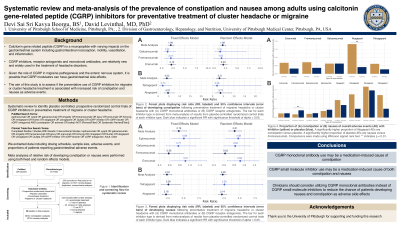Back


Poster Session E - Tuesday Afternoon
Category: Functional Bowel Disease
E0260 - Systematic Review and Meta-Analysis of the Prevalence of Constipation and Nausea Among Adults Using Calcitonin Gene-Related Peptide (CGRP) Inhibitors for Preventative Treatment of Cluster Headache or Migraine
Tuesday, October 25, 2022
3:00 PM – 5:00 PM ET
Location: Crown Ballroom

Has Audio

Devi Sai Sri Kavya Boorgu, BS
University of Pittsburgh School of Medicine
Pittsburgh, PA
Presenting Author(s)
Devi Sai Sri Kavya Boorgu, BS1, David J. Levinthal, MD, PhD2
1University of Pittsburgh School of Medicine, Pittsburgh, PA; 2University of Pittsburgh Medical Center, Pittsburgh, PA
Introduction: Constipation and nausea are frequently encountered medication-associated side effects. Calcitonin gene-related peptide (CGRP) inhibitor use may be potential cause of constipation and nausea, but the magnitude of this impact in patients with cluster headaches or migraines has not been well characterized.
Methods: We conducted a systematic review using PUBMED and ClinicalTrials.Gov to identify randomized, placebo-controlled clinical trials using anti-CGRP antibodies or CGRP receptor antagonists for the prevention of cluster headaches or chronic migraine. We extracted data including CGRP inhibitor dose, dose frequency, and the reported proportions of patients in these trials with constipation and nausea. We compared the prevalence of these symptoms in those on medication to those on placebo, using two-tailed paired t-tests. The risk of a specific adverse event was assessed using odds ratios with 95% confidence intervals.
Results: We identified an initial pool of 449 studies to which we applied a priori criteria to yield 27 studies for nausea and 15 studies for constipation analyses. In the anti-CGRP antibody-treated group, the pooled prevalence of constipation was 2.69% (N=3,574) and nausea was 2.03% (N=9,231), compared with 1.39% (N=4,520, p=0.004) and 2.47% (N=11,680, p=0.0095) in placebo-treated groups, respectively. In the CGRP receptor antagonist-treated group, the prevalence of constipation was 5.20% (N=1,847) and nausea was 6.04% (N=1,689), compared to 1.46% (N=1,852, p=0.002) and 3.05% (N=1,967, p=0.0001) in placebo-treated groups, respectively. CGRP receptor antagonist use demonstrated greater risks of constipation (OR=3.71 [2.41, 5.71], p< 0.0001) and nausea (OR=2.04 [1.48, 2.83], p< 0.0001) than anot-CGRP antibody use (constipation: OR=1.96 [1.41, 2.72], p=0.0001; nausea: OR=0.82, [0.68, 0.99], p = 0.0343). Anti-CGRP antibody use did not appear to be associated with an increased risk of nausea.
Discussion: Constipation and nausea are associated with CGRP inhibitor use in those with cluster headache or migraine. With the increased prevalence of CGRP inhibitor use, CGRP inhibitor-associated constipation and nausea cases could grow substantially. Gastroenterologists should consider CGRP inhibitor use as a medication-induced cause of nausea and constipation. CGRP receptor antagonist use is associated with higher rates of these gastrointestinal side effects than the use of anti-CGRP antibodies.
Disclosures:
Devi Sai Sri Kavya Boorgu, BS1, David J. Levinthal, MD, PhD2. E0260 - Systematic Review and Meta-Analysis of the Prevalence of Constipation and Nausea Among Adults Using Calcitonin Gene-Related Peptide (CGRP) Inhibitors for Preventative Treatment of Cluster Headache or Migraine, ACG 2022 Annual Scientific Meeting Abstracts. Charlotte, NC: American College of Gastroenterology.
1University of Pittsburgh School of Medicine, Pittsburgh, PA; 2University of Pittsburgh Medical Center, Pittsburgh, PA
Introduction: Constipation and nausea are frequently encountered medication-associated side effects. Calcitonin gene-related peptide (CGRP) inhibitor use may be potential cause of constipation and nausea, but the magnitude of this impact in patients with cluster headaches or migraines has not been well characterized.
Methods: We conducted a systematic review using PUBMED and ClinicalTrials.Gov to identify randomized, placebo-controlled clinical trials using anti-CGRP antibodies or CGRP receptor antagonists for the prevention of cluster headaches or chronic migraine. We extracted data including CGRP inhibitor dose, dose frequency, and the reported proportions of patients in these trials with constipation and nausea. We compared the prevalence of these symptoms in those on medication to those on placebo, using two-tailed paired t-tests. The risk of a specific adverse event was assessed using odds ratios with 95% confidence intervals.
Results: We identified an initial pool of 449 studies to which we applied a priori criteria to yield 27 studies for nausea and 15 studies for constipation analyses. In the anti-CGRP antibody-treated group, the pooled prevalence of constipation was 2.69% (N=3,574) and nausea was 2.03% (N=9,231), compared with 1.39% (N=4,520, p=0.004) and 2.47% (N=11,680, p=0.0095) in placebo-treated groups, respectively. In the CGRP receptor antagonist-treated group, the prevalence of constipation was 5.20% (N=1,847) and nausea was 6.04% (N=1,689), compared to 1.46% (N=1,852, p=0.002) and 3.05% (N=1,967, p=0.0001) in placebo-treated groups, respectively. CGRP receptor antagonist use demonstrated greater risks of constipation (OR=3.71 [2.41, 5.71], p< 0.0001) and nausea (OR=2.04 [1.48, 2.83], p< 0.0001) than anot-CGRP antibody use (constipation: OR=1.96 [1.41, 2.72], p=0.0001; nausea: OR=0.82, [0.68, 0.99], p = 0.0343). Anti-CGRP antibody use did not appear to be associated with an increased risk of nausea.
Discussion: Constipation and nausea are associated with CGRP inhibitor use in those with cluster headache or migraine. With the increased prevalence of CGRP inhibitor use, CGRP inhibitor-associated constipation and nausea cases could grow substantially. Gastroenterologists should consider CGRP inhibitor use as a medication-induced cause of nausea and constipation. CGRP receptor antagonist use is associated with higher rates of these gastrointestinal side effects than the use of anti-CGRP antibodies.
Disclosures:
Devi Sai Sri Kavya Boorgu indicated no relevant financial relationships.
David Levinthal: Alexza Pharmaceuticsals – Consultant. Takeda Pharmaceuticals – Consultant.
Devi Sai Sri Kavya Boorgu, BS1, David J. Levinthal, MD, PhD2. E0260 - Systematic Review and Meta-Analysis of the Prevalence of Constipation and Nausea Among Adults Using Calcitonin Gene-Related Peptide (CGRP) Inhibitors for Preventative Treatment of Cluster Headache or Migraine, ACG 2022 Annual Scientific Meeting Abstracts. Charlotte, NC: American College of Gastroenterology.
